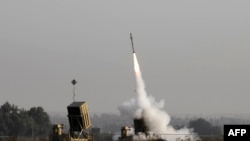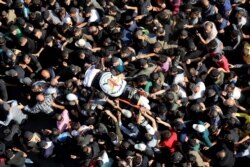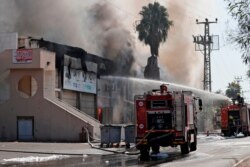Two days of intense fighting between Israel and the Palestinian Islamic Jihad (PIJ) militant group last week once again highlights Iran's expansionist ambitions in the Middle East, experts say.
Founded in 1981, PIJ is a Sunni militant group based in the Gaza Strip that follows a radical religious ideology. It is the second-largest militant group in the Palestinian region.
The PIJ reportedly receives financial and political support from Iran, and has for years been developing its rocket program with direct assistance from Tehran.
In the latest conflagration, Israeli officials said that Islamic Jihad fired more than 450 rockets toward Israeli territory, paralyzing parts of Israel. The Israeli military responded immediately by targeted militant positions, killing at least 34 Palestinians.
Despite an Egyptian-brokered cease-fire Thursday, several rockets were fired from Gaza toward Israel. Still, the truce seems to be largely holding.
The recent airstrikes and rocket fire followed an Israeli operation that killed Baha Abu al-Ata, a senior PIJ leader. He was believed to be planning a cross-border infiltration.
Seth Frantzman, director of the Middle East Center for Reporting and Analysis, says Israel's decision to eliminate the militant leader came after its efforts failed to dissuade him from continuing his activity.
"The decision to target al-Ata was made last month or even in the last year, because Islamic Jihad has increased its rocket fire against Israel," he said. "Israel is trying to degrade the capabilities of Islamic Jihad so that in the future it will not have to face many rockets."
Israeli media reports that Islamic Jihad used about 5 percent of its rockets in the recent fire, some of which are long-range missiles with a range of up to 80 kilometers.
The Hamas factor
Hamas, the largest militant group that has been ruling Gaza since 2006, has condemned the recent Israeli attack. However, it has opted to refrain from engaging in this battle.
Even though both Hamas and Islamic Jihad receive Iranian assistance and share the same anti-Israeli stances, the two Palestinian militant groups have different strategic objectives in their armed struggle against Israel.
Experts believe that while Hamas has embraced violence as a way to force Israel to make concessions such as opening up trade with Gaza, Islamic Jihad continues to seek direct confrontation with Israel as part of Iran's regional strategy.
Hamas' deep connections with the Muslim Brotherhood, a pan-Arab Islamic movement, makes it even more divergent from Islamic Jihad, which has reportedly inched closer to Iran. Many of its members have reportedly converted to Shi'ite Islam, which is also the dominant religion in Iran.
"In the recent fighting, Hamas was probably happy to see Islamic Jihad losing some of their rockets and maybe their lives, of course quietly, while officially supporting them," said Frantzman.
But despite these differences, Iran has managed to sponsor both groups at the same time, "because both groups are committed to Israel's destruction — a goal cherished by [the Supreme Leader of Iran] Ayatollah Khamenei and the [Islamic Revolutionary Guard Corps] IRGC," said Sam Bazzi, director of the Islamic Counterterrorism Institute in Washington.
Yet, Islamic Jihad represents a unique case in Iran's traditionally sectarian-driven strategy in the Middle East.
"Islamic Jihad — even though it's made up of primarily Sunni Arabs — is one of Iran's rare exceptions, where you have a Sunni proxy jihadist extremist organization," Frantzman said.
IRGC role
Some experts also note that by directly arming and supporting groups like Islamic Jihad in the Palestinian territories, Iran has succeeded in maintaining a foothold close to the Israeli heartland.
"While both Hamas and Palestinian Islamic Jihad are Islamist groups, PIJ differs in that it receives IRGC training and a relatively much larger aid budget from Iran," said Bazzi.
And while Hamas controls all government institutions in Gaza, it has allowed PIJ to operate in the area and occasionally wage attacks on Israel.
"The arrangement in Gaza between Hamas and PIJ suits Tehran and fits into the mold it had frequently applied in the region: Iran-friendly governments accountable in front of the international community and secretive striking arms directly controlled by the [IRGC's elite force] Quds Force and the Supreme Leader's Office," said Bazzi.
'Destabilizing force'
In recent months, Israeli officials have often referred to Islamic Jihad as a force aiming to destabilize the region.
Experts said the fact that PIJ acts on behalf of Iran causes concern among Israeli officials, who do not want to engage in a war with Islamic Jihad on one front and the Lebanese Hezbollah militant group on the other.
If Israel "can neutralize Islamic Jihad and weaken them and send a message that their senior officers will be killed, then [Israel] can preempt the chances of a two-front conflict," said Frantzman.
He added that "Israel wants to devote most of its resources to defend against the Iranian threats in the north, which is the real strategic threat. Israel doesn't view Gaza and the fighters there as a strategic threat. It's more of a tactical threat."
Islamic Revolution fundamental
Seyyed Reza Hajji, a political lecturer based in Qom, Iran, says Iran's support for jihadist groups derives from a firm belief in the Islamic Revolution's fundamentals that aim at routing out Israel from all areas Tehran views as "occupied lands."
"Iran has continued supporting all Islamic movements, challenging the hegemony of the illegitimate regime of Israel," he said.
"Tehran has empowered the oppressed Palestinian people, particularly in Gaza, by supporting groups and movements with different ideological orientations and agenda," Hajji said, adding that, "The underpinning is that they receive support as long as they resist the Israeli oppression."







